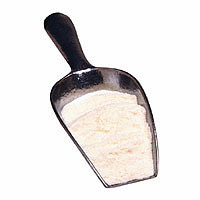health guides
Soya Flour

Preparation, Uses, & Tips
Since soya flour can become packed in its bag or container, always stir it before measuring. Soya flour can be used as-is, or, for a pleasant nutty flavour, toast it before adding it to a recipe. Place the soya flour in a dry skillet and stir over medium heat for a few minutes.
Soya flour can be used as a thickening agent in gravies and sauces, or it can be added to baked goods. In baked products, soya adds tenderness and moisture and helps to keep products from becoming stale. Products containing soya flour brown more quickly, so it is sometimes necessary to either shorten the baking time or decrease the temperature slightly. For products that do not contain yeast, such as muffins and cookies, replace up to 1/4 the total amount of flour called for in a recipe with soya flour. For products that are yeast-raised, such as bread, replace up to 15% of the flour called for in the recipe by placing two tablespoons of soya flour in the cup before measuring each cup of flour. Using more soya flour than this will cause breads to be too heavy and dense, since soya flour is free of gluten, the protein that gives structure to yeast-raised baked products.
Soya flour also makes a good egg substitute in baked products. Replace one egg with 1 tablespoon of soya flour plus 1 tablespoon (15mL) of water.
Copyright © 2024 TraceGains, Inc. All rights reserved.
Learn more about TraceGains, the company.
The information presented in the Food Guide is for informational purposes only and was created by a team of US–registered dietitians and food experts. Consult your doctor, practitioner, and/or pharmacist for any health problem and before using any supplements, making dietary changes, or before making any changes in prescribed medications. Information expires December 2024.


 We are proud to announce that
We are proud to announce that  As the market evolves, customers increasingly request a wider variety of omega-3 options for their lipid...
As the market evolves, customers increasingly request a wider variety of omega-3 options for their lipid...  Maintaining healthy glucose levels is crucial for preventing metabolic conditions like diabetes,...
Maintaining healthy glucose levels is crucial for preventing metabolic conditions like diabetes,...  Looking at formulating a new vitamin blend? Discover
Looking at formulating a new vitamin blend? Discover 







































